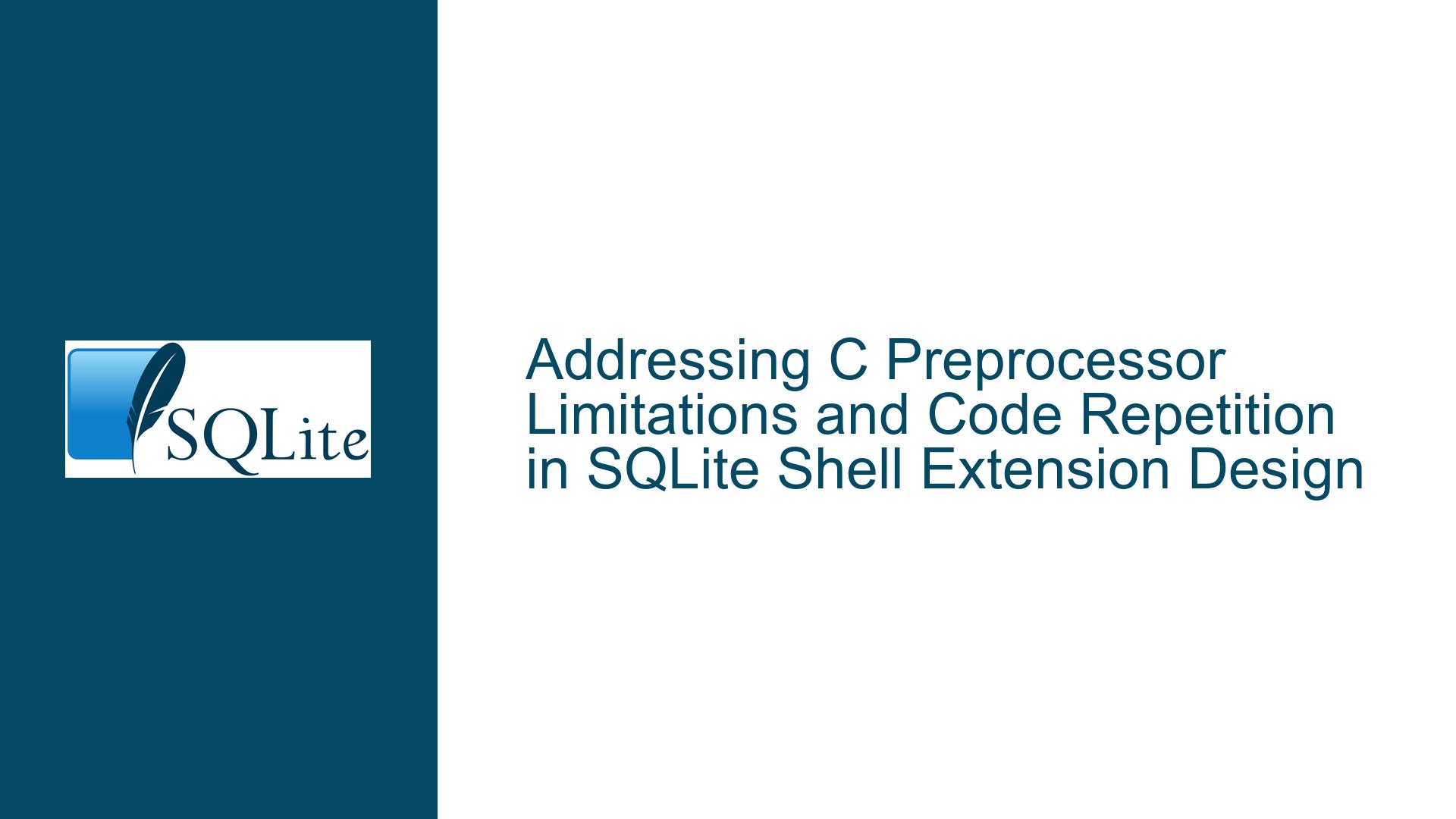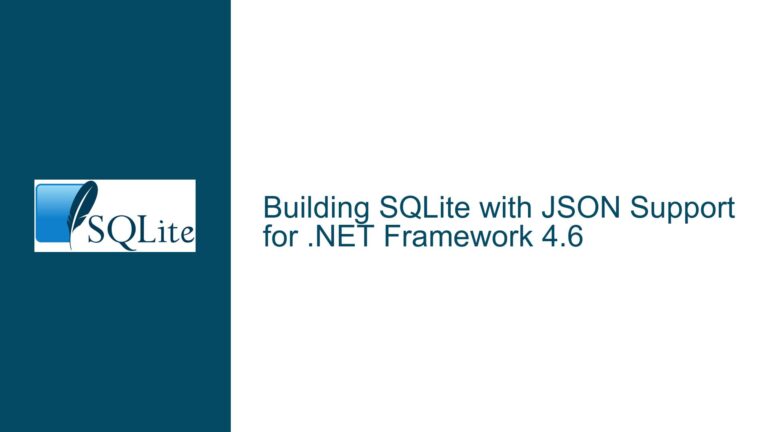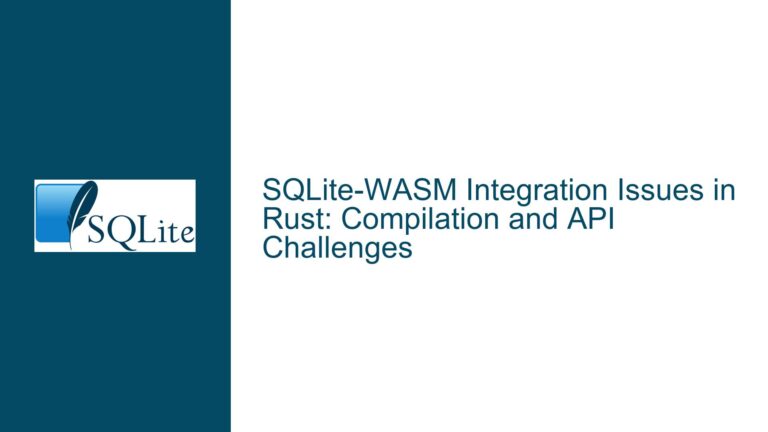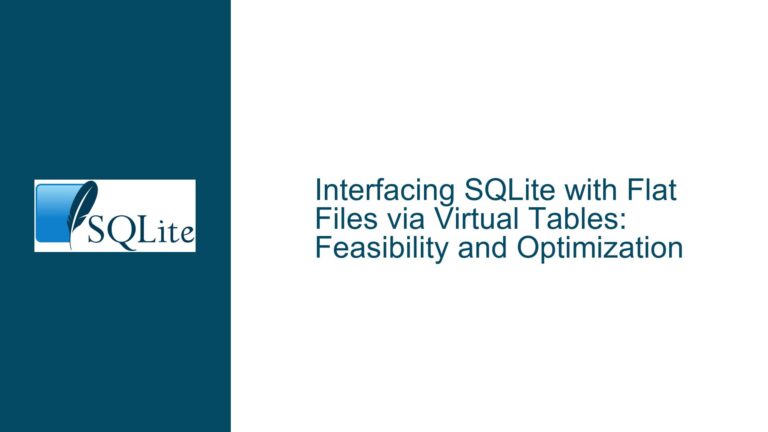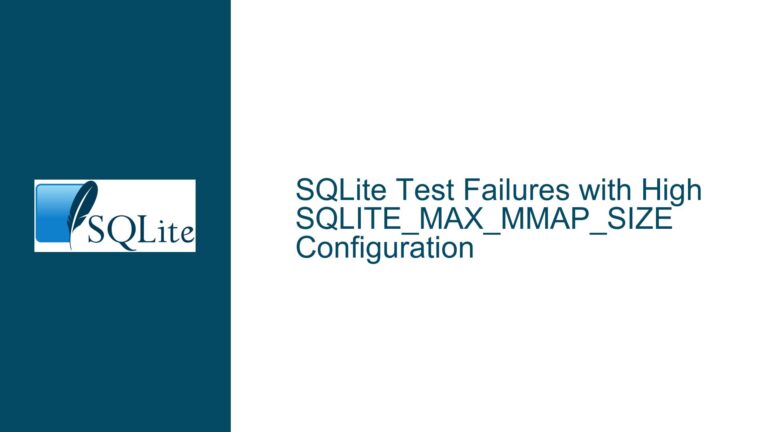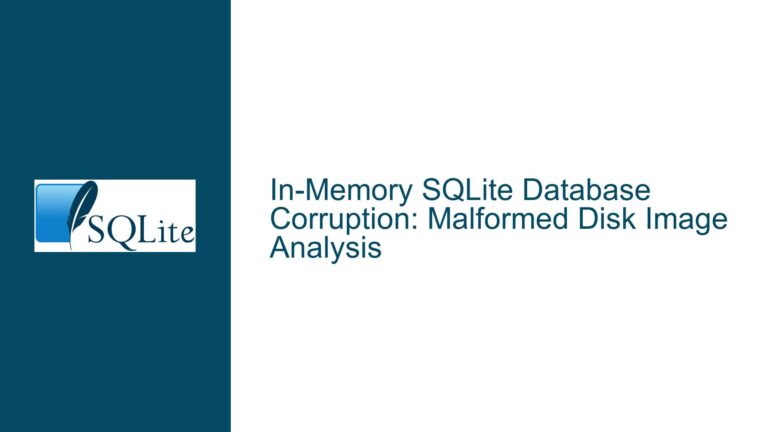Addressing C Preprocessor Limitations and Code Repetition in SQLite Shell Extension Design
Challenges in Maintaining Cross-Language Compatibility and DRY Principles in Shell Extension Macros
The SQLite shell extension interface relies on a series of C preprocessor macros to abstract differences between C and C++ implementations. These macros—PURE_VMETHOD, CONCRETE_METHOD, and DERIVED_METHOD—are defined in src/shext_linkage.h and duplicated across interface declarations, implementation bindings, and derived class definitions. While this approach allows extensions to be written in either language, it introduces significant maintenance overhead. The C preprocessor’s limited text-processing capabilities force developers to manually repeat method signatures with slight variations, violating the Don’t Repeat Yourself (DRY) principle. For example, a single virtual method must be declared twice: once as a PURE_VMETHOD for the abstract interface and again as a CONCRETE_METHOD for the concrete implementation. The DERIVED_METHOD macro further complicates implementations by requiring class-specific boilerplate code. This redundancy increases the risk of signature mismatches and complicates API evolution. Additionally, the preprocessor’s inability to introspect or validate method arguments exacerbates debugging challenges when interface contracts change.
The core issue stems from the tension between two objectives: supporting cross-language extensions with minimal tooling dependencies and maintaining a clean, maintainable API definition. The current design prioritizes simplicity at the expense of code elegance, creating friction for developers who must navigate repetitive macro expansions and manual synchronization of method lists. For instance, adding a new method to a shell extension class requires modifying three separate macro invocations with identical parameter lists. This process is error-prone, as omitting a parameter in one location or altering a method signature inconsistently will result in compilation errors or runtime crashes. Furthermore, the DERIVED_METHOD macro’s reliance on token pasting generates syntactically valid but visually opaque code, obscuring the underlying method implementations and complicating static analysis. These issues collectively reduce the accessibility of the extension system for new developers and increase the maintenance burden for the SQLite team when updating interfaces.
Root Causes: Preprocessor-Driven Abstraction and Interface-Implementation Coupling
The reliance on the C preprocessor for cross-language abstraction is rooted in historical constraints and the goal of minimizing build-time dependencies. The SQLite extension system was designed to work with C89-compliant toolchains, which lack native support for C++-style interfaces or runtime polymorphism. The *METHOD macros attempt to bridge this gap by generating both virtual function tables (v-tables) for C++ and structs of function pointers for C. However, the preprocessor’s inability to iterate over lists or generate code conditionally forces developers to manually duplicate method definitions. For example, the PURE_VMETHOD macro declares a pure virtual method in C++, while the CONCRETE_METHOD generates a concrete implementation wrapper. Each macro requires a parameter list and an explicit argument count because the preprocessor cannot programmatically count arguments or infer types. This manual counting introduces fragility, as changing a method’s parameter count requires updating multiple macro invocations.
The repetition across PURE_VMETHOD, CONCRETE_METHOD, and DERIVED_METHOD stems from the lack of a single source of truth for method signatures. The shext_linkage.h file acts as a de facto interface definition, but its macro-based syntax cannot be programmatically queried or transformed. Consequently, extension developers must re-declare methods in implementation files using DERIVED_METHOD, which combines the base class name, derived class name, and method parameters through token concatenation. This approach tightly couples interface definitions to their implementations, making it difficult to refactor classes or extract shared behavior. For instance, renaming a base class requires updating every DERIVED_METHOD invocation in derived classes, a process that cannot be automated with standard build tools. The preprocessor’s text substitution model also interferes with IDE features like code navigation and autocompletion, as expanded macro code bears little resemblance to the original source.
The design’s adherence to minimal tooling dependencies exacerbates these issues. By avoiding code generators or external build systems, the SQLite team ensured compatibility with environments where only a C compiler and standard Unix tools are available. However, this constraint rules out modern metaprogramming techniques like X macros or embeddable scripting languages, which could reduce repetition. The result is a system that achieves cross-language compatibility at the cost of increased cognitive load for developers, who must mentally track method definitions across multiple files and macro expansions. Over time, this complexity discourages experimentation with the extension API and increases the likelihood of subtle bugs caused by inconsistent method signatures.
Transitioning to SQL-Based Code Generation for Declarative Interface Definitions
A viable solution involves replacing preprocessor macros with SQL-driven code generation, using the SQLite command-line shell itself as the metaprogramming engine. This approach leverages SQL’s declarative syntax to define interfaces in a database schema, then generates C and C++ bindings through queries. The process begins by creating a table to store method signatures:
CREATE TABLE shext_methods (
class_name TEXT NOT NULL, -- e.g., 'ShellExtension'
method_name TEXT NOT NULL, -- e.g., 'open'
return_type TEXT NOT NULL, -- e.g., 'int'
parameters TEXT NOT NULL, -- e.g., 'const char *zName, int flags'
arg_count INTEGER NOT NULL, -- e.g., 2
is_pure BOOLEAN NOT NULL, -- 1 for pure virtual methods
PRIMARY KEY (class_name, method_name)
);
Developers populate this table with method definitions using INSERT statements, serving as the single source of truth. To generate C++ abstract classes, a SQL query formats each row into a PURE_VMETHOD declaration:
SELECT printf('virtual %s %s(%s) = 0;', return_type, method_name, parameters)
FROM shext_methods
WHERE is_pure = 1 AND class_name = 'ShellExtension';
Concrete method wrappers are generated similarly, with the query appending argument-count metadata required by SQLite’s C API. For C implementations, a separate query emits function pointer structs initialized with generated stub functions. This eliminates the need for DERIVED_METHOD macros, as the code generator can directly instantiate derived classes by joining the base class’s method table with implementation-specific overrides.
To integrate this system into the build process, developers run a shell script that executes the generation queries and writes output to header or source files. For example:
sqlite3 shext_api.db < generate_cpp_interfaces.sql > src/shext_interfaces.h
sqlite3 shext_api.db < generate_c_impls.sql > src/shext_impls.c
This approach reduces repetition by deriving all method declarations from a centralized schema. When the API evolves, altering a method’s parameters in the shext_methods table automatically propagates changes to generated code. The SQLite shell’s availability on all supported platforms ensures compatibility without introducing new toolchain dependencies. Additionally, the database can include validation constraints—such as CHECK clauses ensuring arg_count matches the number of commas in parameters—to catch errors during generation rather than at compile time.
Extension authors benefit from skeleton generation scripts that output boilerplate code for new classes. A query like:
SELECT printf('void %s_%s(%s) { /* TODO: Implement */ }',
:derived_class, method_name, parameters)
FROM shext_methods
WHERE class_name = :base_class;
produces ready-to-customize method stubs, accelerating development. Migrating existing extensions to this system involves parsing current *METHOD macros into INSERT statements—a one-time conversion that pays long-term dividends in maintainability. By embracing SQLite’s own capabilities for structured data management, the extension interface becomes self-documenting and resistant to signature drift, addressing the original issues without sacrificing the design’s simplicity goals.
